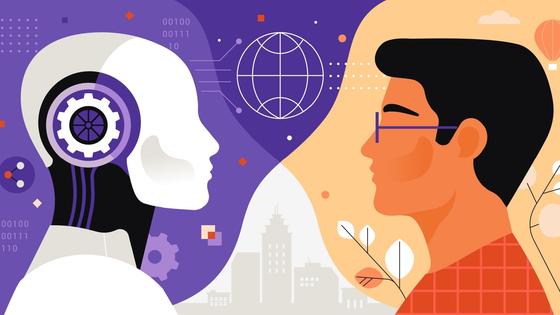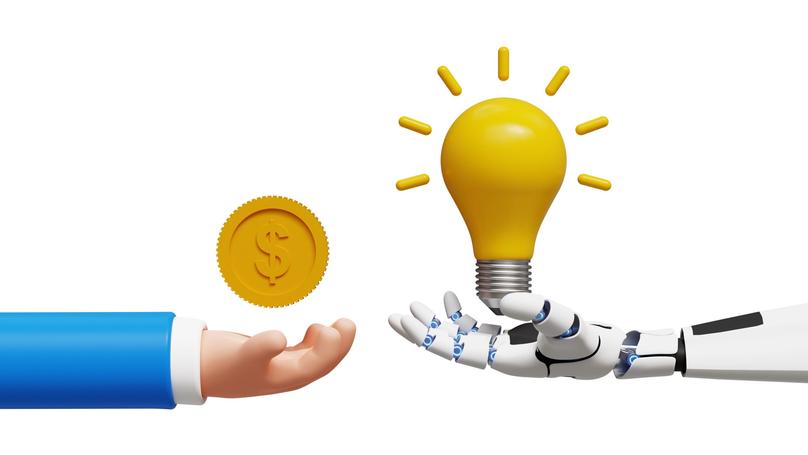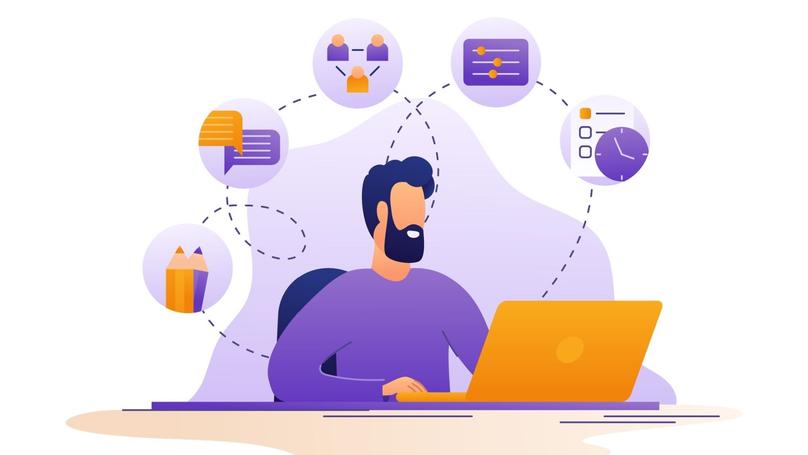Outpacing AI
Recently, headlines about the new capabilities of artificial intelligence have been making headlines online quite often.

Robots with AI can perform simple surgical operations, write books, generate paintings and more. The question frequently arises about what will happen to humanity next, and there will be a need for human experts. In this article, you will find the answer to these questions and learn how to develop in the "new world" and be a sought-after professional.
Why Artificial Intelligence Will Not Replace Humans?

It may seem that such a large-scale development of AI and its introduction into all spheres of life will take jobs away from people. Unlike artificial intelligence, humans can feel feelings, emotions, and responsibility. Therefore, there are several reasons why AI will not replace humans. For example:
- Creativity. AI can find patterns by analysing considerable data but cannot think outside the box. This quality allows people to create innovations and develop new approaches to problem-solving.
- Empathy is the ability to understand the emotions and needs of others. It is essential to build interpersonal relationships, to understand the needs of loved ones better, and, in the professional sphere, to meet clients' needs.
- Morality and Ethics. Humans have a moral compass. They can make decisions based on values and principles of ethics. AI, in turn, does not possess such a set of qualities unless a human has built moral norms into its algorithms.
AI can perform some tasks that used to be associated only with human abilities. There are several ways to help you remain a sought-after professional:
- Training and Skill Development: AI can perform routine and repetitive tasks but lacks human creativity and emotional intelligence. Therefore, it's essential to develop skills that are difficult for AI to replace, such as atypical problem-solving, strategic planning and human interaction.
- Specialisation: Try to become an expert in a narrow field where your expertise is more complex for AI to replace. For example, if you are a doctor, you can focus on specialising in a particular area of medicine where expert opinion and complex medical decision making is required.
- Flexibility and Adaptability: In an era of rapidly evolving technology, it is essential to be flexible and adaptable. Keep up with trends in your field, learn new tools and technologies and actively apply them in your work.
- Collaborate with AI: Use artificial intelligence to make your work more efficient. AI can help automate routine tasks, analyse large amounts of data and provide additional insights for decision-making.
Lectera’s Online Courses by topic
What are Soft Skills, and Why Do I Need to Develop Them?
Soft skills are skills related to interpersonal communication, emotional intelligence, time management, leadership, creativity and other human aspects. In the age of neural networks and automation, soft skills are becoming especially valuable for several reasons:
- Collaboration and teamwork: Neural networks and automated systems can perform tasks individually, but completing complex projects requires team collaboration. Communication skills, effective collaboration, and group work help improve productivity and quality of work.
- Leadership and Management: Networked systems emphasise traditional hierarchical management to flexible leadership and autonomy. The skills to build and maintain relationships, motivate colleagues and resolve conflicts will make you a valuable contributor or leader in such an environment.
- Creativity and Innovation: Human creativity and the ability to think abstractly allows you to generate new ideas, solve atypical problems and innovate in the workplace, which is prioritised over automated systems.
- Emotional Intelligence: Understanding and managing your own and other people's emotions is vital to successful interactions in a professional environment. Empathy, empathy and adaptability can be challenging to automate and remain important in the age of neural networks.
Soft skills help people maintain high professionalism, compensate for automation's shortcomings, and make unique contributions to work and the quality of interaction. These skills also help us adapt to change and successfully interact with technology, including neural networks.
Here are Some Actionable Ways to Develop Soft Skills

- Practice Communication: Actively participate in conversations, discussions and presentations. Develop effective listening, reasoning, and questioning skills to make interactions productive.
- Course Programmes and Training: Take courses and attend training and seminars to help you develop specific soft skills-for example, courses on leadership, communication, time management, etc.
- Goal Setting and Self-Reflection: Identify the specific skills you want to develop and set your goals. Evaluate your progress regularly and self-analyse where you still need to work.
- Teamwork: Participate in projects that require teamwork. It will help you develop skills in teamwork, effective task sharing and conflict resolution.
- Feedback: Be open to feedback from colleagues, management and customers. It will help you understand your strengths and weaknesses and find areas for improvement.
- Develop Emotional Intelligence: Pay attention to your emotions and the emotions of others. Understand the principles of emotional intelligence, learn to manage your feelings and understand the emotional needs of others.
It is important to remember that developing soft skills is a long-term process that requires constant practice and dedication. Gradually applying these techniques to your daily life and work will result in positive changes in yourself. Developing soft skills improves your personal and professional life. It helps you become a valuable and sought-after professional in today's world, where interaction with people and the ability to solve atypical problems are essential.
Lectera’s Online Courses by topic
Here are some tips for being a better machine in terms of professional development
- Develop skills that are difficult for AI to replace: Focus on developing skills that require creative thinking, atypical problem solving, interpersonal interaction and emotional intelligence. AI can process data and perform specific tasks, but you can outperform it in areas that require human intelligence.
- Learn from AI and harness its power: Use AI to automate routine tasks, analyse data and gain insights. Embrace AI tools and technologies to improve efficiency and make more informed decisions.
- Be prepared for continuous learning: Today's world changes rapidly and requires constant learning and development. Be open to new technologies, trends and innovations in your field. Invest time and resources in self-education and participation in training and professional programmes.
- Develop interpersonal skills: Human interaction and emotional intelligence will always be valuable skills that are hard to replace with AI. Develop your ability to connect with people, communicate effectively, resolve conflicts and work in a team.
- Always strive for self-improvement: You must constantly improve and refine your skills to stay ahead of AI. Be open to new challenges, set high goals, and strive to continually grow professionally.
Remember that human intelligence and abilities are unique and valuable, and focusing on soft skills development will help you be better than artificial intelligence in the professional sphere.
Share this with your friends via:
Latest News

A significant stage in the development of the alternative education system has begun in West Northamptonshire in the UK: the County Council is actively calling on parents, guardians, and trustees to participate in shaping the future of this key area.

Outwoods Primary School in Atherstone, Warwickshire, having experienced deep sadness after the loss of their famous cat, Silla, has found solace in a new pet – a Maine Coon named Aloysius O’Hara.

In modern universities, artificial intelligence, and in particular ChatGPT, is rapidly transforming from a controversial tool into a full-fledged student assistant.

An innovative educational project is gaining momentum in UK primary schools, aiming to change attitudes towards video games.

The Massachusetts Institute of Technology (MIT) presents MIT Learn – a revolutionary online platform that opens a “new front door” to access university knowledge and resources.












 “I’m Here for the Long Haul”: When Loyalty to a Company Becomes Toxic
“I’m Here for the Long Haul”: When Loyalty to a Company Becomes Toxic
 Freelancing, Remote Work, Office Jobs, or Consulting: How to Choose the Work Format That’s Right for You
Freelancing, Remote Work, Office Jobs, or Consulting: How to Choose the Work Format That’s Right for You
 Test: How Prone Are You to Abusive Behavior as a Manager?
Test: How Prone Are You to Abusive Behavior as a Manager?
 Test. What superpower would you possess if you were a superhero?
Test. What superpower would you possess if you were a superhero?
 Test. What Should You Let Go of Before Winter Ends?
Test. What Should You Let Go of Before Winter Ends?
 Test. Which Ritual Should You Start Practicing This Winter?
Test. Which Ritual Should You Start Practicing This Winter?
